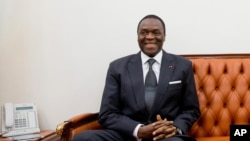Armed separatists fighting for creation of an English-speaking state in Cameroon opened fire on the country's defense minister and defense chief Friday. Neither official was hurt but at least 10 people were killed in the attack in the English-speaking southwest region, where the minister was visiting to encourage his troops fighting the separatists.
Military spokesperson Colonel Didier Badjeck says more than 100 armed separatists mounted several road blocks on the route linking the south western regional town of Kumba and the locality of Mbonge to stop Defense Minister Joseph Beti Assomo, who was leading a high profile military delegation dispatched by President Paul Biya to encourage the country's soldiers fighting armed separatists.
Badjeck says as they removed the road blocks, armed separatists who were hiding in nearby bushes started shooting and the military fired back killing at least 10 of the attackers.
He says the terrorists who were heavily armed with war weapons, locally made guns, cutlasses and poisoned spears started shooting ceaselessly towards the military convoy and the minister's car for about 30 minutes. He says the military fired back and hundreds of the attackers escaped to the bushes where they are still being hunted by the military.
Several members of the minister's delegation were wounded. Hundreds of villagers and travellers along the road fled to the bushes.
Beti Assomo ordered the military to make sure all of the attackers are either arrested or neutralized. He also congratulated the military for what he called successes in the fight against armed separatists since President Biya declared war against them in November 2017, describing the separatists as terrorists.
He says he found a very determined military, ready to fight until peace returns in the English speaking north west and south west regions.
The armed separatists used social media to warn Cameroon's defense minister against visiting any part of the English speaking northwest or southwest regions, which they claim as the new state of Ambazonia.
Tensions in Cameroon began in November 2016, when English-speaking teachers and lawyers in the northwest and southwest regions protested, seeking reforms and greater autonomy and expressing frustration with the dominance of the French language and the marginalization of Cameroon's Anglophone population.
The crisis intensified when Ayuk Tabe, the self-declared president of the English speaking Republic of Ambazonia, was arrested alongside 48 others in Nigeria and extradited to Cameroon.
More than 160,000 people have been internally displaced and tens of thousands have fled to neighboring Nigeria, according to the United Nations. The government of Cameroon says more than 200 government troops and civilians have been killed.
International NGO and rights groups have decried the harsh government crackdown and indiscriminate arrests of suspects.







